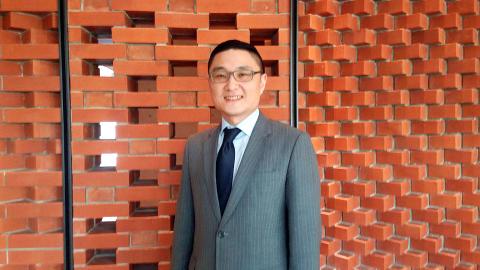Taipei Times (TT): Eslite Hotel (誠品行旅) has recently increased its exposure after two years of low-key operations. What is driving the change?
Tony Wang (王本仁): There is ample room for improvement in terms of marketing strategy and financial performance. Occupancy rates stood at 30 percent in the first year when Eslite acted as operator on behalf of Taipei New Horizon Co (臺北文創), a subsidiary of Fubon Group (富邦集團). The two sides sometimes disagreed on hotel operations.
Last year, they renegotiated cooperation terms to grant Eslite Group (誠品集團) full management rights and limited Fubon to the role of a landlord. Occupancy rates rose to 50 percent last year, still leaving much to be desired.

Photo: Crystal Hsu, Taipei Times
The sharp decline in the number of Chinese tourists also called for strategic adjustments as they accounted for 70 percent of guests.
We aim for a 10 percent increase in revenue this year. To that end, we want to boost occupancy rates to 60 percent by doubling the number of business travelers. We have recruited new communications and marketing personnel to boost sales, and improve relationships with customers and the media.
Eslite Hotel used to be quiet and low-key, but will adopt a vibrant approach going forward. Group chairman Robert Wu (吳清友) is serious about the business.
TT: Has the group considered cooperating with international hotel chains to take advantage of their membership?
Wang: Eslite Hotel is not in need of brand recognition, as it is a unit of Eslite Group, whose business interests encompass department stores, a bookstore chain, real-estate development and professional kitchen equipment. In addition, the group operates fine-dining restaurants and wine cellars. It has more than 1 million members who might help boost occupancy rates if properly motivated.
The Eslite brand commands esteem and approval among Chinese, which explains why Chinese tourists account for a large share of the hotel’s clientele.
We aim to expand the brand recognition to other international travelers around the world. It is not healthy to put all of one’s eggs in one basket. The goal is achievable given the hotel’s convenient location, and above-par hard and soft products.
TT: What will Eslite Hotel do to cope with increasing competition and flattish numbers of inbound travelers?
Wang: We welcome tourists from China and all other nations, but recognize the need to expand and diversify our customer base. The impact of the declining number of Chinese tourists will be more evident this year after it started to weigh on the sector in the second half of last year.
However, the trend will help awaken market players to the need to focus on the fundamentals: Good food, good service and a distinctive appeal, among other qualities. Hotels must improve and innovate to stay profitable and stop taking growth for granted.
Excluding Chinese tourists, the increase in Taiwan’s inbound travelers has been limited over the past decade. Some hotels might engage in price wars to survive, but Eslite will not join because that strategy would be detrimental for all.
While we cannot change the macro-environment, we can seek to outcompete rivals with higher quality service and affordable rates.
Eslite is a boutique hotel in the Songshan Cultural and Creative Park (松山文創園區), near two MRT stations and close to the heart of Taipei’s Xinyi District (信義). We set average daily rates at NT$7,300, lower than the NT$10,000 or so at W Hotel and Le Meridien Taipei (台北寒舍艾美酒店).
The hotel has a large collection of books and artwork decorating its 104 guestrooms and public spaces. The artworks made by local artists convey Taiwan’s cultural identity and set the hotel apart from international brands.
TT: Has the nation’s tourism industry plateaued and is it set for a long downturn?
Wang: It might slow down in the short term, but is not necessarily going downhill in the long term. Hong Kong received 59.3 million inbound travelers in 2015, despite its small area and a lack of manufacturing industry. The former British colony has thrived as a regional financial hub and food paradise.
Taiwan, blessed with more natural scenic attractions and home to world-class manufacturers, also should put up a solid performance regardless of cross-strait ties.
The government can help make Taiwan friendly to foreign investors and professionals. The ease of doing business plays an important role in boosting business travelers. Policymakers should take concrete steps to address the issue.
TT: Would the Taipei Dome across from Eslite Hotel pose a threat, as it includes space for lodging, shopping and entertainment facilities?
Wang: On the contrary, we expect the project to enhance the cluster effect, bring in large crowds and benefits to Eslite Hotel. Although we have a cafe, a Western restaurant and a function room, we do not expect food and beverage to generate significant revenue because the area is quiet after [weekday] business hours. That might change after the Dome opens. Some retailers have opened branches in the Dome’s vicinity in a bid to to enjoy business growth in the future, when entry costs would be much higher. Eslite Hotel would thrive as long as it stays competitive.
TT: Will Eslite Hotel open more outlets?
Wang: The group’s chairman does not rule out that possibility, but expansion is not on the agenda for the time being.

AI SERVER DEMAND: ‘Overall industry demand continues to outpace supply and we are expanding capacity to meet it,’ the company’s chief executive officer said Hon Hai Precision Industry Co (鴻海精密) yesterday reported that net profit last quarter rose 27 percent from the same quarter last year on the back of demand for cloud services and high-performance computing products. Net profit surged to NT$44.36 billion (US$1.48 billion) from NT$35.04 billion a year earlier. On a quarterly basis, net profit grew 5 percent from NT$42.1 billion. Earnings per share expanded to NT$3.19 from NT$2.53 a year earlier and NT$3.03 in the first quarter. However, a sharp appreciation of the New Taiwan dollar since early May has weighed on the company’s performance, Hon Hai chief financial officer David Huang (黃德才)

The Taiwan Automation Intelligence and Robot Show, which is to be held from Wednesday to Saturday at the Taipei Nangang Exhibition Center, would showcase the latest in artificial intelligence (AI)-driven robotics and automation technologies, the organizer said yesterday. The event would highlight applications in smart manufacturing, as well as information and communications technology, the Taiwan Automation Intelligence and Robotics Association said. More than 1,000 companies are to display innovations in semiconductors, electromechanics, industrial automation and intelligent manufacturing, it said in a news release. Visitors can explore automated guided vehicles, 3D machine vision systems and AI-powered applications at the show, along

FORECAST: The greater computing power needed for emerging AI applications has driven higher demand for advanced semiconductors worldwide, TSMC said The government-supported Industrial Technology Research Institute (ITRI) has raised its forecast for this year’s growth in the output value of Taiwan’s semiconductor industry to above 22 percent on strong global demand for artificial intelligence (AI) applications. In its latest IEK Current Quarterly Model report, the institute said the local semiconductor industry would have output of NT$6.5 trillion (US$216.6 billion) this year, up 22.2 percent from a year earlier, an upward revision from a 19.1 percent increase estimate made in May. The strong showing of the local semiconductor industry largely reflected the stronger-than-expected performance of the integrated circuit (IC) manufacturing segment,

NVIDIA FACTOR: Shipments of AI servers powered by GB300 chips would undergo pilot runs this quarter, with small shipments possibly starting next quarter, it said Quanta Computer Inc (廣達), which supplies artificial intelligence (AI) servers powered by Nvidia Corp chips, yesterday said that AI servers are on track to account for 70 percent of its total server revenue this year, thanks to improved yield rates and a better learning curve for Nvidia’s GB300 chip-based servers. AI servers accounted for more than 60 percent of its total server revenue in the first half of this year, Quanta chief financial officer Elton Yang (楊俊烈) told an online conference. The company’s latest production learning curve of the AI servers powered by Nvidia’s GB200 chips has improved after overcoming key component